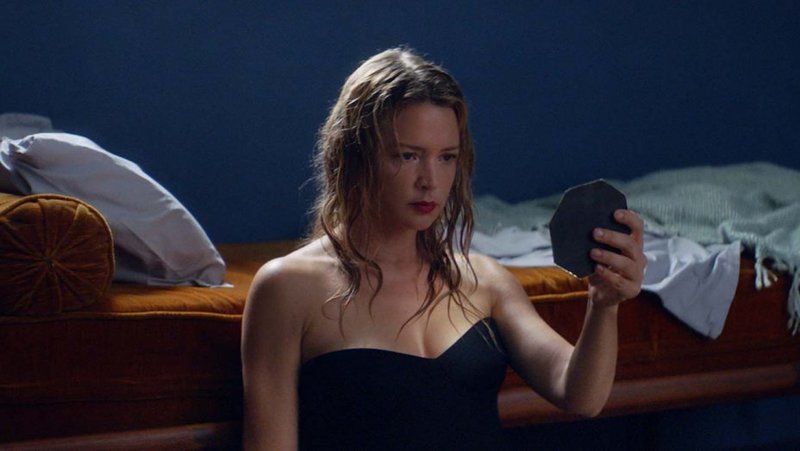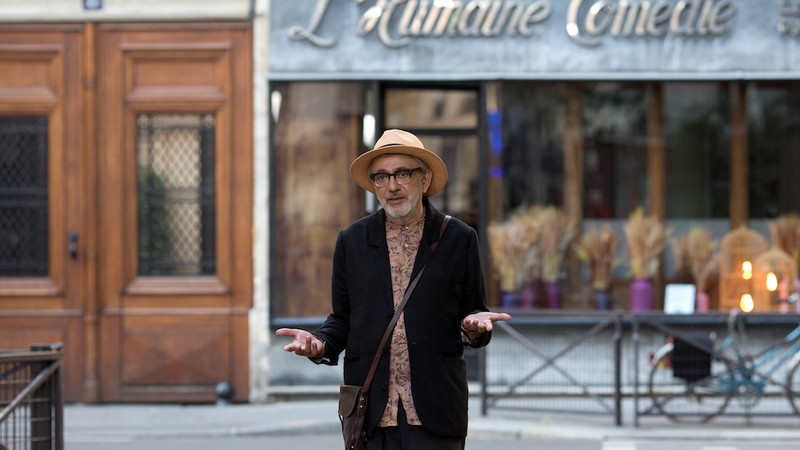
It is the final day of the 72nd Cannes International Film Festival, before the awards in the Palme d’Or competition are announced tomorrow night. The clattery sound of carry-ons being rolled along the sidewalks on the main streets is everywhere on this cloudy, chilly day. Cannes will disappoint in the weather department to the very end.
Selfies are in progress everywhere too. Last year, the festival banned the taking of selfies on the red carpet, but that only applies to the official screenings. This morning, as crowds arrived for the last of the 8:30 am press screenings, the red-carpeted steps up to the Grand Theatre Lumiere were clogged with people putting themselves in the Riviera picture for one last time.
For all its vaunted emphasis on art in the festival’s official sections, there’s nothing Cannes like better than a good juicy scandal that makes for international press. If it involves one of the festival films, all the better. Controversy, glamour and sex are what keep this festival on top of the world when it comes to reputation.
French director Abdellatif Kechiche won the Palme d'Or in 2013, for his very sexually explicit “Blue Is the Warmest Color.” Aside from the fact that the film became controversial for its content, the two lead actresses, with whom the Palme was shared, later charged that they had been exploited. His new film “Mektoub, My Love: Intermezzo” was a very late addition to this year’s Cannes competition, but announced before the film was even completed. The expectation that Kechiche will try to top himself was already in the air.
A pretty young woman is posing for a photographer on the beach. She smiles and flirts, and flips her long hair this way and that. The photographer murmurs encouraging comments: “Beautiful,” he repeats. The camera slowly pans down her back, revealing that she is naked. A large, widescreen close-up of her buttocks lingers on the screen. It’s an in-your-face image, memorable because at its most elemental, this is what “Mektoub” is all about.
The Arabic term “mektoub,” applies to something that is predestined, while the musical term intermezzo refers to an interval between other sections of a piece. The title “Mektoub, My Love: Intermezzo,” grants more of a sense of narrative destiny than the film actually contains in its portrayal of the afternoon and evening of a group of young friends and one new arrival, in a seaside town.
Marie (Marie Bernard), an 18-year-old Parisian student on vacation, is reading on the beach when two handsome men, Aime (Romeo De Lacour) and Tony (Salim Kechiouche) introduce themselves. After some small talk, they invite her to join their group, all locals in their late twenties. Despite the age difference, she fits in easily. Not much happens: they eat and drink, and exchange light conversation, a few personal details, and a bit of flirting.
From the very beginning of this experimental saga, Kechiche puts the emphasis on a prominent display of female flesh. Only 15 minutes into this 3.5-hour film, the seemingly prurient gaze of the director has become gratingly gratuitous. The women are uniformly young, beautiful, and bountifully endowed. They stretch and preen and stroke suntan lotion on themselves and each other. Their bare butts, forever in the film frame, bloom provocatively from minimal bikini bottoms.
After 30 minutes, the scene cuts to an evening at a club where the same gang is gathered. This is the film’s location for the next three hours. The women arrive in abbreviated shorts and lacy bra tops. Energetic dancing to an unflagging beat and the droning squeals of electronic club music becomes the foreground of the film, with any interactions and subplots subjugated to this jarring visual tapestry and high-volume audio bombardment.
Kechiche’s creates an exercise in duration and endurance that has more in common stylistically with Gaspar Noe’s “Climax” than with his own “Blue Is the Warmest Color.” The women dance and dance, their closely observed butts twitching, twerking, grinding and humping, their breasts jiggling, hour after hour. For the viewer, the tedium of a frenzied mechanical mating dance replaces pleasure with a desperate tedium.
Interludes are brief, revealing snatches of relationships, past loves, and dilemmas. Kechiche appears to be making a statement about fleeting connections and life changes. Ophelie (Ophelie Bau), the lush-bodied woman all the males in this group have fixated on since childhood, is pregnant by a man other than the fiancé she is to marry in three weeks.
In the course of this night, she will have graphic and very indisputably real sex with yet another longtime friend in the club’s bathroom. It is the film’s most singularly provocative scene, and one likely to cause much controversy wherever the film is released. A cynic might wonder if the driving force behind “Mektoub” is Kechiche’s desire to renew his title as the festival’s most talked about provocateur.

French actress Adèle Exarchopoulos, one of the co-stars of Kechiche’s “Blue Is the Warmest Color” turned up today as a co-star of “Sibyl,” by director Justine Triet (“Victoria”), screening in competition for the first time. “Sibyl” is a bizarre film that progressively looks and acts like a farce but isn’t. Of all the films of variable effectiveness and quality in this year’s Cannes, competition, this one comes off as a half-baked mess.
Sibyl (Virginie Efira), is a Paris psychotherapist who has decided to reduce her case load in order to write a novel. She’s a recovering alcoholic who lives with her husband, two children, and her sister. Just as it seems she has succeeded in divesting herself of clients, an emergency call from a woman, Margot (Exarchopoulos), draws her into a close enabling relationship with the young actress.
Margot has a decision to make, based on a relationship gone wrong, and is looking for an authority figure in her life to take on the responsibility. Sibyl resists, but gives in shortly after Margot departs for a three-month film shoot on the volcano island of Stromboli (a location cinephiles will recognize from the Roberto Rossellini film of that title). She is forced to join her patient in order to stabilize the patient’s life. This is where things get loony.
Sibyl is working on her novel nightly, taking material from her meltdown-heavy, emotionally fraught relationship with Margot. Among other things, that involves being a go-between on the film set between Margot and her ex, a famous actor, who is also the director’s current lover. As scenes from the film in progress become mixed up with flashbacks from Sibyl’s own life, her accidental affair with the actor, and the material for the novel that she reenacts in her room, it all starts to seem like comedy. Unfortunately, that’s not the case.

Palestinian director Elia Suleiman has been refining his exquisitely ironic form of deadpan comedy since “Divine Intervention” premiered at Cannes in 2002. In this new feature “It Must Be Heaven,” one of the final competition titles of the festival, he once again stars himself as the observer of human foibles and follies, this time in a search of an alternative homeland.
Suleiman’s comic method is sly subversive. His keenly observed episodes can seem like unrelated black comic incidents, until the whole fabric of his theme begins to appear.
He opens “It Must be Heaven” with a zinger. A colorful candlelit Easter procession moves through a Nazareth street and arrives at the church door. The elaborately robed priest makes three ritual knocks but the heavy door remains closed. A voice from inside whispers rude taunts. Ripping off his golden headgear, the priest rushes around to a side door and kicks it open. The crowd is frozen in pious attention outside, while the sounds of a bottle hitting the floor and someone receiving a thorough thrashing are heard from within.
There is a very precise symmetry to Suleiman’s visual composition in this film that feeds into his concept of parallels. Two stern-faced brothers dressed exactly alike take sips from their glasses of Johnny Walker in unison, as they berate a restaurant owner at length for not cautioning them that the sauce contained wine. Suleiman, the grey-haired silent observer in a straw hat, watches from his table across the way.
An elderly father and his adult son sit back to back on adjacent apartment balconies. “Filth” shouts the father; “Your filth,” responds the son. “Stink,” rages the father; “Your stink,” replies the son. Two uniformed soldiers sit side by side in the front seat of a car that passes Suleiman’s vehicle on the highway. They casually trade sunglasses in gestures that mirror each other. A slow pan to the left disturbingly reveals a blindfolded prisoner sitting quietly in the back seat.
Suleiman, the alert Buster Keatonesque observer, has a face from which anything can be read. The slight lift of an eyebrow or the widening of the eyes could be consternation, amusement, alarm, or disapproval. In that way, he puts the primary burden of reaction on his audience. What he sees for us is incongruous, absurd, and nonsensical in the way of ordinary human madness. Two determined cops harass a tourist, while a few feet away unnoticed, a man takes a public piss against a wall and tosses his beer bottle to the street.
Suleiman moves on to Paris in search of brighter horizons. He sits in an outdoor café, and unlike back in Nazareth, a dizzying parade of beautiful, fashionable and suggestively dressed women pass before him in slow motion. In this seeming land of license, a solicitous medical team delivers a dinner made to order to a homeless man sleeping on a sidewalk. Two identical street cleaners dressed in yellow rubber suits play a carefree game of street hockey with a broom and soda cans.
Other incidents gradually begin to suggest that self interest, rigid authoritarianism and nationalism prevail in Paris too. The street cleaners pause their game long enough to gawk at a TV on view from a bar window. A massive Bastille Day military parade and air show is in progress, perhaps the very one that had wowed the U.S. president.
In Paris, the film also reveals that Suleiman is not an anonymous Everyman, but the film director playing himself. Sitting mute and stricken before a producer in a trendily stark office, he hears that the company welcomes a film about the Palestinian conflict, but the project that Suleiman has proposed is “not Palestinian enough.”
Suleiman moves on to New York, where his sense of absurdity becomes heightened. The populace shops and walks the streets with automatic weapons, bazookas, and assault rifles slung over their shoulders. Carloads of cops descend on a woman dressed as an angel in Central Park, and engage in a buffoonish dance of pursuit through the trees, one of the film’s most lyrical sequences.
After spotting a flier on a lamppost, Suleiman consults a storefront psychic reader in New York. Bending over his Tarot cards in concentration, he assures the director: “There will be a Palestine. Absolutely.” Suddenly, he takes a second look at the cards, “Wait; hold on ...”
Barbara Scharres is the former Director of Programming at the Gene Siskel Film Center, a public program of the School of the Art Institute of Chicago.





